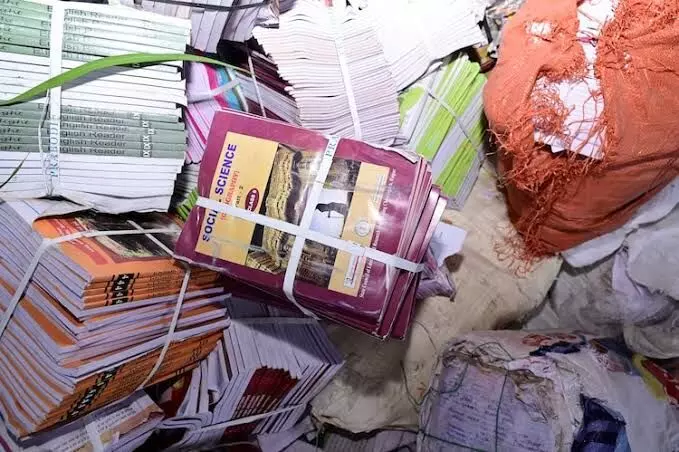The Great Textbook Scam: How Government Books Ended Up in Scrap

The Chhattisgarh textbook scam is more than just an instance of corruption—it is an indictment of the systemic neglect that has plagued the education system in one of India's most underprivileged states. The revelation that lakhs of government textbooks, meant for students, were instead sold as scrap raises critical questions about governance, accountability, and the very future of education in Chhattisgarh. This scandal has not only exposed a deep-rooted nexus between officials and unscrupulous elements but also painted a grim picture of the already fragile state of education in a region where literacy rates lag behind the national average.
How could such a scam be orchestrated in a state where every educational resource is precious? The investigation has uncovered a well-planned mechanism involving five District Education Officers (DEOs) from Raipur, Rajnandgaon, Surajpur, Dhamtari, and Jashpur, among others. These officials, entrusted with the noble task of ensuring that children receive their educational materials on time, instead treated these books as tradable commodities. The probe report, spanning 1045 pages, exposes the role of at least 24 individuals, including two IAS officers, who facilitated the sale of 80 tonnes of textbooks within a mere 35 days. This staggering number suggests that the scam was not a one-time event but rather an ongoing racket that had been allowed to flourish due to administrative negligence and a lack of stringent oversight.
The modus operandi of the scam is as disturbing as its implications. Textbooks meant for the 2024-25 academic session, along with stock from as far back as 2014, were diverted and sold to a recycling plant in Raipur. This raises a critical question: if such a large volume of books was siphoned off, what were students studying in the past decade? Were they receiving outdated or second-hand materials? Or, worse, were they being deprived of learning altogether? The thought is chilling, especially considering that Chhattisgarh, a tribal-dominated state, already struggles with high dropout rates, inadequate school infrastructure, and a severe shortage of quality educators.
Education in Chhattisgarh is already in a precarious state. According to recent data, literacy rates among the tribal population remain alarmingly low, with many children forced into labor to support their families. The state’s ambitious education programs have often faltered due to poor implementation, lack of trained teachers, and, as this scam highlights, deep-seated corruption. The selling of textbooks for personal gain is not just an act of financial fraud; it is an act of moral bankruptcy, an outright betrayal of the tribal children who look to education as their only ladder out of poverty.
The political fallout of this scandal has been intense. Former minister Vikas Upadhyay, who raised the alarm in the assembly, has called it one of the biggest betrayals of public trust in recent history. The Congress party has slammed the ruling government for its inability to ensure basic educational needs are met, while opposition leaders have demanded strict action against those responsible. But political blame games aside, what real measures will be taken to prevent such incidents in the future? The state government has promised action, but if past cases of corruption in tribal education are anything to go by, accountability may remain elusive.
The larger question that this scam brings to the fore is whether Chhattisgarh is heading towards a complete collapse of its educational framework. If textbooks can be stolen and sold in bulk without immediate detection, what does that say about the state’s monitoring systems? If the education department is complicit or ignorant of such widespread malpractice, how can it be trusted to ensure quality education for its students? The answer is troubling.
For a state like Chhattisgarh, where many tribal children still struggle to get access to basic education, this scandal is not just about stolen books—it is about stolen futures. Education is the foundation of progress, and when that foundation is compromised, the entire socio-economic fabric of a region is at risk. If corrective action is not taken immediately, Chhattisgarh will continue to see a widening gap between its tribal population and the rest of the country, perpetuating cycles of poverty, unemployment, and social marginalization.
This scam should serve as a wake-up call for policymakers. Immediate reforms are needed to restore faith in the education system. First, strict monitoring mechanisms should be introduced to track the distribution and utilization of textbooks. Second, independent audits should be conducted annually to ensure that educational resources reach students without diversion. Third, those responsible for the scam must face the strictest legal consequences to deter future malpractice. Lastly, the state must invest in strengthening its tribal education programs with renewed focus and transparency.
The Chhattisgarh textbook scam is not just a case of corruption; it is a crime against the future of an entire generation. If education, the very tool meant to empower the underprivileged, is treated as a mere commodity for illicit trade, then the state's development dreams will remain a distant illusion. The government must act decisively, not just to punish the guilty but to rebuild the trust and hopes of the students whose education was compromised by this betrayal.
